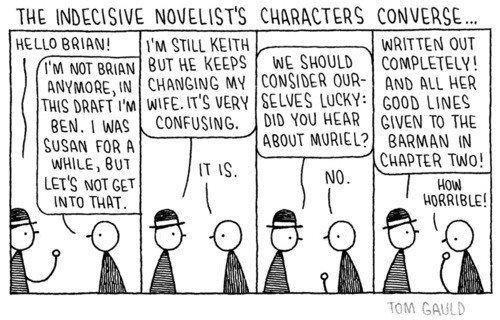
Now then, time to get to work. You've got your mindset. You know where the story is going. Got the characters all worked out, the world's built, setting's done, plot is..... what do you mean you're stuck? What's the problem? Flaw in the outline? Headache? Ah, writer's block.
Welcome to phase 2: the brick wall.
It happens more than you think. You're rolling along at 300 miles an hour. You're in tune. It's like you could finish the whole thing in one night. Then, the wall. Some little issue pops up and stops you cold. Doesn't make sense. You know what happens next. Why won't it come?
Well first off, take a deep breath before you pull your hair out. Wigs are pricy you know. This is a common problem for writers. Now we gotta work past it. The trick is how.
Well, one thought is to identify the issue. WHY are you stuck? What's wrong? Is the upcoming action out of character for someone? Plot issue? Think about it. Take pain medication for that headache. Breath, ponder, breath, sleep, dream, ponder. You'll get there. There are so many reasons it could be wrong, and sometimes if you're anything like me, all you have is a cringing feeling when you consider where you want to go with it. 90% of the time, there's a reason for it. Yeah, you know what's coming, but how exactly is it going to play out? Okay, protagonist wins, antagonist loses. How? Bad guy dead? Both dead? Other casualties? Draw? What do you need out of this scene? Forget the pain meds. You're at your limit already.
Let's talk methods around it. First option, toss the outline. "WHAT?! Do you know how much time I spent on that?!" Yes. And look where it's getting you. A good outline is supposed to help you like a road map. Thing is, a lot of books get hijacked by their characters, and like and old GPS device, that "road map" needs to be updated to compensate. So okay, maybe we aren't totally tossing it. But it may be time to rethink it in light of where you are, and where the story is trying to go. Maybe the action you had in mind, doesn't work anymore. Or needs to happen differently to better grow the characters you have. Two friends on the field of battle. Maybe they're not as close as they seam, or maybe they are, but an outsider might see a.... shall we say, more volatile relationship. Or perhaps those two people who were meant to hate each other till the last page, grow to become fast friends. Hey, I told you, enough pain meds.
Fine, try this. Rewrite. Go back to the start of, or just before the trouble scene, and start again. This time, try a different path. Or let the characters guide you the way they're pushing. An architect or a designer will often pull back, shake their head saying, "Nah, not right. New template please!" So must you sometimes. It's like the previous efforts made you aware of the problem, and your story will often help you find a way around it.
Another thought? Talk it out. Find someone, or a few someones (though keep the number low), that are willing to listen. It'd be best if they're friends or family you trust so you can be sure you're getting honest responses. Plus it's nice to have them to come back to again and again if possible. Then, talk it out. How much detail is up to you. I give a lot of detail, but I know the details will never leave my sounding board. Another author I know gives almost none. Your choice. But how ever much it is, talk out the issue. Outline the problem as best you can, and be willing to consider the things offered. Also, be prepared, and prepare your sounding board, for the times where they won't have to say a word. Just you talking through the problem is enough. Yet somehow, talking to yourself or a wall just doesn't work. Or it never has for me. I don't know. Maybe it would for you.
Of course there are three things to keep in mind at all times.
1) Trust yourself and your work.
I've written things that at the time seamed wrong, but when I went over it again later, I realized why it was so right. My characters were living enough to go their own way and to show me why it was the right one. I owed it to them to trust them, and they have rarely let me down.
2) Some times, stop thinking.
"Oh not this again." I know, it's becoming a mantra of sorts, but that's because it works! We all want our works to be these beautiful, glimmering, perfect spectacles of literary art. We want the words to be perfect, the characters to be perfect, and especially for sci-fi and fantasy authors, we want our worlds to be even more perfect. That's all well and good, but... you do lose something there after a while. Make the statute chisel-stroke by chisel-stroke. Don’t use an electron microscope to aim your super-collider to blow off one molecule at a time. You end up losing the flavor of the art you were trying to create. Step back. See the art, then make it live.
3) Keep writing.
I know I'm one who isn't a fan of "Write no matter what", but you do need to keep at it. There's a difference between not writing every day and not writing at all. If you let a wall stop you, you'll find yourself hip deep in unfinished works because you didn't fight hard enough through that wall. Writing takes a lot of dedication. You want to make it work, then you gotta work yourself.
Trust me, it's worth the headaches.



 RSS Feed
RSS Feed
